Fish oil is full of omega-3 fatty acids, which are linked to a variety of health benefits. Fish oil is naturally found in oily fish. However, not everyone eats enough oily fish to get the amount of omega-3s they need to stay healthy. That’s where a fish oil supplement comes in.
Fish oil supplements provide the omega-3s you may be missing from your diet. While the evidence is somewhat mixed on the benefits of fish oil, it may be able to support your brain and heart health while fighting inflammation.
We reviewed many of the most popular fish oil supplements on the market and ranked them according to a set of scientifically-backed principles.
Rankings
1. Omegawell by LiveWell Labs
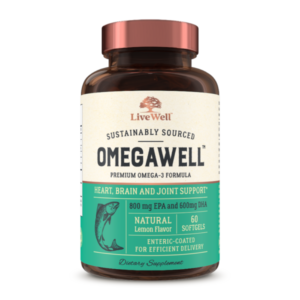
This fish oil by Omegawell is the best on the market. It includes high levels of both EPA and DHA, which are the two necessary nutrients required to make fish oil work. Many supplements include DHA because it is directly linked to several benefits. However, EPA is required for your body to used DHA properly. We loved that this supplement included high amounts of both.
It is also completely natural and doesn’t contain any additives. It is also made in an FDA-approved facility. Because of these factors, it is Fitbug’s #1 fish oil supplement.
2. Optima Omega-3 by Nuzena
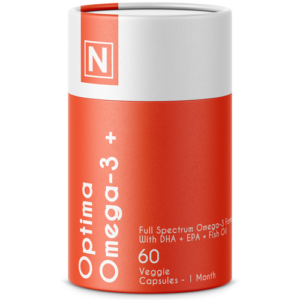
Nuzena makes no-nonsense formulas that are decently inexpensive. This fish oil may not contain the highest amount of DHA, but it is one of the most complete formulas on the market.
This company also tests its products monthly for potency and mercury levels. Because supplements are not regulated, this sort of testing is essential for safety and quality.
3. OmegaXL
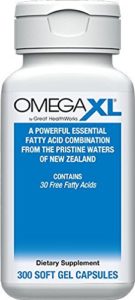
These pills come with 30 fatty acids. While it is a “fish oil,” they don’t get their fatty acids from fish. Because of this, this supplement doesn’t have the fishy aftertaste that is common with other fish oils.
Instead, the supplement is sourced from sustainably farmed Green-lipped mussels in New Zealand. These mussels contain a wide range of fatty acids without the fishy taste.
4. Nordic Naturals Ultimate Omega
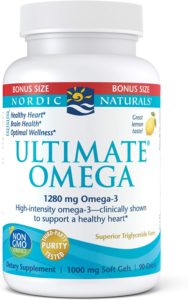
Like good fish oils should, this one includes both EPA and DHA. In total, this supplement includes 1280 mg of omega-3s, which is much higher than many of the other supplements on the market.
They are also third-party tested for purity and quality, ensuring that each pill contains what the bottle says it contains.
5. Nature Made Fish Oil
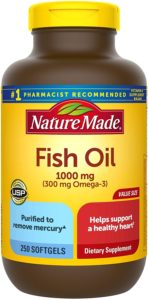
This supplement by Nature Made contains 1000 mg of a variety of different omega-3s. It includes the right mix of EPA and DHA, which are the fatty acids you’re looking for.
We also liked that this supplement was decently inexpensive. If you’re looking for a budget option, this may be it.
6. MAV Nutrition Omega 3 Fish Oil
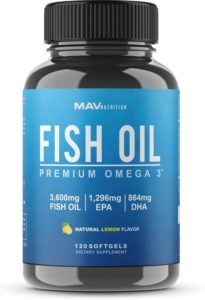
With 3600 mg of fish oil per serving, this supplement contains a lot of DHA and EPA. To help cover up the fishy flavor, each pill has a natural lemon flavor added. They are also designed to avoid some of the unpleasant side effects that are common with fish oils.
For safety and potency, this fish oil is purified with molecular distillation.
7. Nature’s Bounty Fish Oil
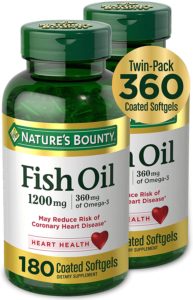
With 1200 mg of fish oil per serving, this supplement includes a decent amount of DHA and EPA. However, the exact amounts of DHA and EPA are not listed.
Plus, these pills are decently inexpensive and gluten-free.
8. Omega-3 Wild Alaskan Fish Oil
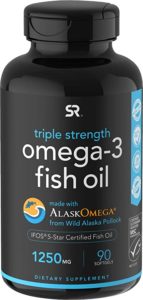
This supplement uses fish oil from wild-caught salmon that are certified by the Marine Stewardship Council. It includes a blend of EPA and DHA, which are the two fatty acids associated with all the health benefits.
We like that this company gives you a 90-day satisfaction guarantee. If you don’t like them after 90 days, you can get your money back.
9. Dr. Tobias Omega-3 Fish Oil Triple Strength
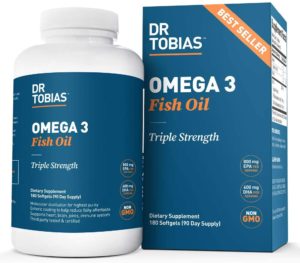
This fish oil is made with 100% non-GMO, wild-caught fish. The fish is FDA-registered and inspected in a GMP-certified facility, helping to ensure the safety of the product. It is also third-party tested for purity and safety.
This supplement also comes with more DHA and EPA than most without being expensive.
10. Sundown Fish Oil
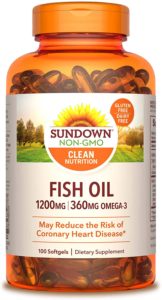
This supplement is very cheap, but it isn’t as high-quality as other options on the market. It is non-GMO, and the company guarantees a certain level of purity.
Each serving is two capsules, so you will need to take this supplement twice a day for it to be effective.
How we ranked
There is a vast number of fish oil supplements currently on the market. Fish oil is one of the most common supplements, likely because many people do not eat much oily fish. To narrow down the vast pool, we had to use strict, scientifically-backed principles.
The first of these was the manufacturing practices of the company. Fish oil is a bit complicated to make since many fish contain a high level of mercury. For a fish oil supplement to be safe, this mercury has to be filtered out.
The best way to ensure that a fish oil supplement is safe is through third-party testing. If a supplement is third-party tested for purity, that means a separate company tests the fish oil and reports its contents. This tells you precisely what is in the fish oil, including whether or not it contains a high amount of mercury.
Secondly, we considered just how much fish oil was included in each serving. The amount of fish oil each supplement contains varies widely. You can find some supplements with 4000 mg of fish oil and others with just 500 mg. This is a huge difference. In general, more is usually better.
We also looked specifically at the DHA and EPA contents. These two fatty acids are the ones most associated with positive health benefits. Fish oil might contain a lot of omega-3 fatty acids, but only a small amount of DHA and EPA. It just depends on what sort of fish is used and how the supplement is manufactured. Typically, you want as much EPA and DHA as you can get.
In many cases, we recommend customers completely ignore the total amount of fatty acids included and instead look at the DHA and EPA amounts. These are the two ingredients that matter.
Much of the current research involves DHA and points to it having a variety of health benefits. Because of this, some companies include just DHA in their supplements. However, EPA is essential as well, even if it isn’t mentioned as much in scientific research. Both are necessary to take advantage of the health benefits.
Benefits
Fish oils help reestablish a healthy fat ratio. The western diet has recently become very high in omega-6s. These fatty acids are found in things like processed vegetable oils, while health omega-3s are found in animal products.
Some years ago, it was considered “healthy” to ditch butter in favor of vegetable oils. However, we now know that this is not a healthy decision. When you consume too many omega-6s and not enough omega-3s, you do not get a proper ratio of fatty acids, which can contribute to a variety of health problems (1).
For example, one study found that those with much higher consumption of omega-6s were much more likely to be overweight (2). To put this in perspective, historically, the ratio was like 1:1. However, in the western world, it is not difficult for someone to consume a ratio of omega-6s to omega-3s that is closer to 20:1.
Fish oils can help support your heart. Heart disease is serious business. It is one of the leading causes of death worldwide (3).
Luckily for us, those who eat more fish have lower rates of heart disease and heart-related death (4, 5). By taking fish oil, you may be able to get some of the benefits of eating fish and decrease your chance of heart disease.
Studies have shown that fish oil can reduce many of the factors associated with heart disease. For example, fish oil can raise good HDL cholesterol levels, though it does not necessarily lower bad LDL cholesterol levels (6, 7).
It can also help lower triglyceride levels by around 20% (8). If you have elevated levels of blood pressure, even a low dosage of fish oil may help lower it (9). Studies have even shown that fish oil can make arterial plaques more stable, which prevents them from causing your arteries to harden (10).
However, while there is lots of evidence for it reducing many risk factors for heart disease, the evidence on whether or not it can prevent heart attacks is mixed. One study found that there was no difference in cardiovascular disease among those who took fish oil and those who did not (11). More research is needed for us to figure out why this is.
Fish oil may help treat certain mental disorders. Your brain is made up of mostly omega-3 fatty acids. If your diet is low in fatty acids, it can harm your brain function. This has been shown in several studies.
Many studies have linked certain mental disorders to low fatty acid intake. For example, one particular study linked an unhealthy omega-6s and omega-3s ratio with depression. Supplementation with fish oil may be as effective as an antidepressant in treating some people’s depression (12). The same link has been found between omega-3s and schizophrenia (13).
Furthermore, research also suggests that supplementation with fish oil can prevent or improve the symptoms of many different disorders, especially in those who are prone to them (14).
Fish oil may aid in weight loss. Obesity can significantly increase your risk for a variety of diseases, such as heart disease, diabetes, and cancer (16, 17). As much as 13% of the adult world population is obese, though this number is likely higher in places like the United States (15).
Some studies seem to indicate that fish oil can help those who are obese lose weight. When combined with diet changes and exercise, one study found that fish oil improves cardiovascular and metabolic health (18). Another study found that those who ate more fatty fish lost more weight than those who did not (19).
However, this result is not found in all studies. One study found that there was no difference in weight loss for those consuming more fatty acids (20). Another study reported that there did not seem to be a difference. However, the researchers admitted that more diet compliance might make it challenging to study the role of fatty acids on weight loss (21).
Fish oil may support healthy eyes. There are some links between omega-3 intake and eye health. Your eyes rely on omega-3s to function, just like your brain. By increasing your omega-3 intake, you may reduce your chance of specific eye problems.
This may be particularly true for age-related eye problems, which are very common among the senior population (22).
Studies have shown that eating fish can reduce the risk of developing age-related macular degeneration, which affects senior’s eyesight. However, there is some debate on whether a fish oil supplement can provide the same benefits (23, 24).
One small study found that consuming fish oil for 19 weeks resulted in better vision for AMD patients. In other words, it reversed the disease. But this study was tiny. More research is needed for this benefit to be confirmed (25).
Fish oil probably reduces inflammation. Inflammation can be useful in some situations, like when your body is treating injuries and infections. However, too much inflammation is not suitable for your body. It can result in serious illnesses, like obesity, depression, and heart disease (26, 27, 28).
Fish oil has anti-inflammatory properties. It may be able to treat some of these chronic diseases by reducing the amount of chronic inflammation in your body (29).
Some studies have shown that fish oil can directly reduce the production of a molecule called cytokines, which causes inflammation in the body. It has also been reported to lower stress and anxiety (30).
Fish oil may also be able to help with other conditions that are associated with inflammation, like rheumatoid arthritis. This condition can cause painful joints and stiffness. Studies have found that fish oil can reduce these symptoms (31, 32).
Fish oil can improve your skin’s health. Your skin is made out of many omega-3 fatty acids. If these fatty acids are not replaced or repaired, your skin may not be as healthy as it could be (33). Your skin can decline for a variety of reasons, including age and skin exposure.
Studies have shown that fish oil can help with several different skin conditions. For example, one study found that fish oil was effective against psoriasis (34). Another found that is may be helpful against dermatitis (35).
Fish oil is essential for early pregnancy and life. Many organs are made out of omega-3s, including your brain. When you’re pregnant, you are building a new brain from scratch, so you need plenty of omega-3 fatty acids (36).
Your child’s brain also develops a lot in the first year of life, so taking a fish oil supplement while pregnant can also be helpful.
There have been many studies that have looked at the effects of fish oil on pregnant women and their infants. It seems that the most significant improvement is improved hand-eye coordination among the children, even after their toddler years (37). Fish oil may also improve infant eye development and reduce the risk of allergies (38, 39).
Fish oils may reduce overall liver fat. Your liver processes the fat in your body. Because of this, it may play a role in weight gain as well.
If your liver is too fatty, it can cause liver disease. Fish oil supplements may help reduce the amount of fat that builds up in your liver and reduce inflammation. This can reduce the symptoms of non-alcoholic fatty liver disease (40, 41).
Furthermore, liver disease is most common in obese individuals. As we have seen, fish oil can also help with other risk factors of obesity, which may further improve your liver health.
Fish oil may improve the symptoms of clinical depression. Many people with depression have low levels of omega-3s, which hints that fatty acids may be tied to this disease (42).
Some researchers have run with this bit of information and devised studies involving supplementation with omega-3 fatty acids. So far, the results have been good. Studies have shown that supplementing depressed patients with omega-3s may improve their symptoms of depression (43).
A few studies have found that EPA seems to have the most significant effect on depression. If you’re depressed, you may want to choose a product that contains a high amount of EPA in particular (44, 45).
Fish oil may improve ADHD in children. As we have already seen, fish oil helps treat and minimize the symptoms of various mental disorders. It also appears to help symptoms of ADHD in children.
Many different studies have found that children with ADHD have lower levels of omega-3s in their bloodstream (46, 47). Many studies have also found that supplementation with fish oil can help relieve many ADHD symptoms.
For example, studies have found that fish oil can improve task completion. It may also decrease hyperactivity, impulsiveness, restlessness, and aggression (48, 49, 50).
Some researchers have even reported that fish oil may be one of the most promising treatments for ADHD among children (51).
Fish oil may help fight autoimmune diseases. Autoimmune disease is characterized by your immune system, attacking your healthy cells. Type 1 diabetes is the most common example of this, but there are many other examples as well. Omega-3s, which are found in fish oil, have been connected to autoimmune disorders on numerous occasions.
Firstly, getting plenty of omega-3s early in life is tied to a lower chance of developing an autoimmune disease later. Specifically, omega-3s may reduce the risk of type 1 diabetes and multiple sclerosis (52, 53).
Furthermore, if you develop an autoimmune disease like lupus or Crohn’s disease, increasing the amount of omega-3s you eat can improve your symptoms (54, 55).
Fish oil may help reduce asthma in certain people. Asthma is a long-term lung disorder that often comes and goes. While those with asthma usually live long, healthy lives, asthma attacks can be quite severe.
Asthma rates have been rising across the world over the last few years. This is likely caused by several different factors, including things like pollution. However, several studies have also connected omega-3 deficiency to asthma (56).
Side Effects
Fish oil may cause too high blood sugar. If you have diabetes, taking fish oil supplements may increase your blood sugar levels. A smaller study found that taking a small dosage of fish oil caused a 22% increase in blood sugar amount those with diabetes. This effect occurred after taking the fish oil daily for eight weeks (57).
This is likely because large doses of omega-3s can cause your body to produce extra glucose, which leads to high blood sugar (58).
With that said, it appears that only very high doses cause this blood sugar rise. One study found no effect on blood sugar when participants took 3.9 grams of EPA and 3.7 grams of DHA every day (59).
Fish oil may increase bleeding. Bleeding gums and nosebleeds are two widespread side effects of excess fish oil consumption. Taking too much fish oil over an extended period decreases the amount of clotting healthy adults can do (60).
Another study linked nosebleeds to fish oil, with 72% of adolescents taking 1-5 grams of fish oil every day reporting nosebleeds (61).
Because of this, you should not take fish oil before surgery. If you’re taking fish oil, be sure to tell your doctor that you’re taking it.
Fish oil can cause low blood pressure, which is a very well documented side effect. One specific study of 90 people found that taking 3 grams of omega-3 fatty acids decreased both systolic and diastolic blood pressure (62). An analysis of 31 different studies found that taking fish oil significantly reduced blood sugar and may be a promising treatment for high blood pressure and high cholesterol levels (63).
This is great if you have high blood sugar. However, for people with low blood sugar, this can be a significant problem.
Fish oil has been associated with diarrhea. This is a pretty common side effect of fish oil. It usually only occurs with high dosages. However, it depends a lot on your tolerance.
One study review found that diarrhea is the most common effect of fish oil. Other digestive symptoms, such as flatulence, are also quite common (64).
Fish oil may cause acid reflux. Heartburn is not uncommon for those taking fish oil. Other symptoms associated with acid reflux, like nausea and stomach discomfort, are common as well. This is likely because fat can trigger indigestion. Fish oil is mostly made out of fat, so it only makes sense that it would trigger acid reflux and similar symptoms (65).
Splitting up your fish oil dosage may help prevent this problem.
Recommended Dosage
There is no set recommended daily amount for fish oil. Because of this, supplements vary quite a bit in the amount they contain.
It is important to remember that it isn’t all omega-3s that are associated with health benefits. Instead, it seems to be mostly EPA and DHA that have significant benefits. The daily reference intake for EPA and DHA combined is around 250-500 mg (66).
FAQs
What are the benefits of fish oil?
Fish oil is full of omega-3s, including EPA and DHA, which have been shown to have numerous benefits. It can reduce your risk for heart disease, including lowering your blood pressure, triglycerides, and slowing the development of plaque in your arteries.
Furthermore, it can help with numerous mental disorders, including depression and ADHD, in children. Your brain is made out of mostly omega-3s, so increasing the amount of omega-3s in your diet can help your brain function properly.
Who should take fish oil?
Fish oil is useful for a wide variety of people. However, it may be most useful for older people. It can help with cognitive decline, age-related eye problems, and heart disease. These are many disorders that you get when you become older, so taking fish oil may make the most sense for seniors.
Pregnant women, breastfeeding women, and those of child-bearing age should take fish oil as well. Omega-3s are essential for brain development. Most of your brain is made out of omega-3s. When you’re building a whole-brain from scratch, you need quite a lot of omega-3s.
What happens when you take fish oil every day?
Fish oil can help rebalance the omega-3 and omega-6 fatty acid ratio in your diet. Eating a diet that leans heavily towards omega-6s is associated with a variety of health problems. Fish oil contains omega-3s, which helps rebalance your diet over time and lowers your risk for various health problems.
Is fish oil bad for you?
Fish oil is a healthy part of a balanced diet. However, it can cause some health problems when taken at a high dosage. It can increase the insulin level in those with type 2 diabetes. It can also lower your blood pressure, which can be a problem with those who already how low blood pressure.
Does fish oil cause weight gain?
No. Fish oil may help you lose weight when combined with diet and exercise. It can also lower various health risks that are associated with obesity, like fatty liver. So, even if you haven’t lost weight yet, fish oil may help you stay healthy while you take care of it.
Are there any side effects of taking fish oil?
Most side effects associated with fish oil are gastrointestinal. Acid reflux is standard, as are all the things associated with acid reflux. Diarrhea can happen, as well. Most side effects can be minimized by eating right before taking your supplement and splitting your supplement up into multiple dosages.
Do fish oil pills really work?
Yes. Fish oils are full of omega-3s, which have many positive health effects. Of course, these aren’t miracle pills, so they aren’t going to solve all your problems completely. However, they can lower your risk of heart disease and lower your blood pressure. They can also help with your brain health, which can prevent mental disorders and age-related cognitive decline.
What’s the difference between omega-3 and fish oil?
Nothing. Fish oil is made up of omega-3s, which is a type of fat. This type of fat is found elsewhere as well – mostly in animal products. If you want to get more omega-3s in your diet, taking fish oil is one way to get them. It is mostly the ratio between omega-3s and omega-6s that is important. Lowering the amount of omega-6s you eat can also be helpful – doubly so if you’re also taking a fish oil supplement.
Oily fish have plenty of fish oil in them as well, so you can eat oily fish alongside your fish oil supplement for an extra boost.
Is fish oil food for your immune system?
To an extent, DHA can help your body produce antibodies, which are necessary for your immune system. This may aid in your immune response. However, the science on this benefit is relatively new and needs to be studied further.
Related Articles
Recap
Fish oil is full of DHA and EPA, which are omega-3 fatty acids that are associated with a variety of health effects. These fatty acids may be able to reduce your chance for heart disease and keep your brain healthy, which can improve mental disorders like depression and dementia.
Fish oil is incredibly helpful for older people since many of its health benefits can reduce the symptoms of age-related disorders like failing eyesight and dementia. However, pregnant women may wish to take it as well, since it is essential for brain development.
For FitBug’s #1 fish oil supplement, click here.